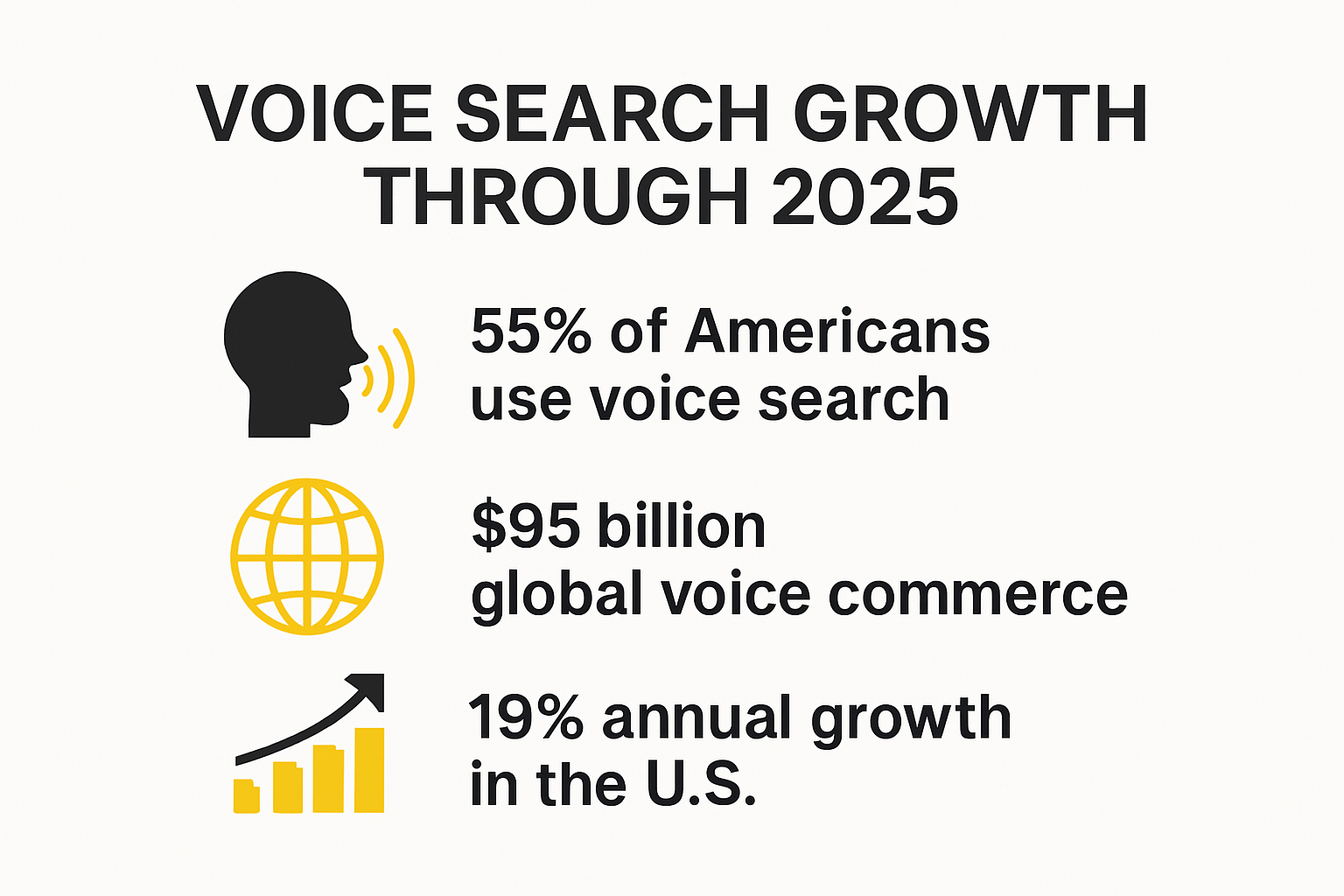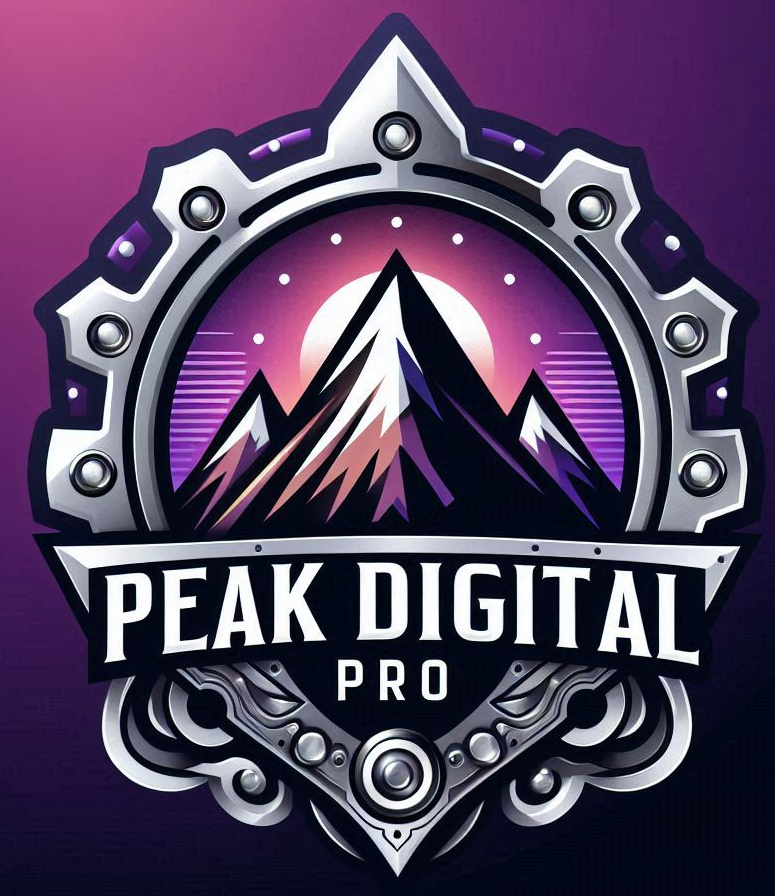Voice Search Optimization 2025: Guide for U.S. Business Owners

Voice search is rewriting the rules of digital marketing in America. Nearly half of Americans already use voice search to shop and global voice shopping is projected to hit $81.8 billion by 2025 . Most people think optimizing for voice means tweaking a few keywords. The real opportunity comes from building content that talks the way your customers do and grabs attention during those quick, conversational searches.
Table of Contents
Quick Summary
| Takeaway | Explanation |
|---|---|
| Voice Search Adoption is Rapidly Increasing | Nearly 50% of Americans use voice search for shopping, and global voice shopping spend is projected to reach $81.8 billion by 2025, indicating a significant shift in consumer behavior that businesses must prepare for. |
| Conversational Content is Essential | Businesses need to create content that mirrors natural speech patterns by using long-tail keywords and answering common user questions directly to align with how voice queries are made. |
| Local Optimization is Key | With 76% of smart speaker users performing local searches weekly, businesses must focus on hyper-local content strategies and detailed schema markup to enhance visibility in local voice searches. |
| Invest in Technical Optimization | Implementing structured data and ensuring mobile-responsiveness are critical for improving voice search discoverability and delivering immediate, relevant responses to voice queries. |
| Track Performance Beyond Traditional Metrics | Businesses should utilize advanced tracking tools and focus on metrics like featured snippet rankings and conversational keyword performance to gauge success in the voice search ecosystem. |
Voice Search Trends Every Business Must Know
Voice search technology is rapidly transforming how consumers interact with digital platforms and make purchasing decisions. The landscape of voice search is evolving at an unprecedented pace, presenting both challenges and opportunities for businesses across all sectors.
The Rising Tide of Voice Search Adoption
Consumer behavior is shifting dramatically toward voice-enabled interactions. Research indicates that nearly 50% of Americans now use voice search when shopping, with global voice shopping spend projected to reach a staggering $81.8 billion by 2025. This represents an extraordinary 322% increase in voice-assisted sales since 2021.
The growth trajectory is clear. Projections show the number of voice search users in the United States will reach 153.5 million in 2025, marking a 2.5% increase from the previous year. This surge signals a fundamental shift in how consumers seek information, make purchases, and interact with digital platforms.

Strategic Implications for Business Owners
Businesses that fail to adapt to voice search optimization risk becoming invisible in an increasingly conversational digital ecosystem. The key differences between traditional text search and voice search demand a radical rethinking of digital content strategy.
Voice queries tend to be more conversational and longer than typed searches. Users ask complete questions rather than typing fragmented keyword strings. For instance, instead of typing “pizza delivery near me,” a voice user might ask, “Where can I get the best pizza delivered to my home right now?”
This shift requires businesses to:
- Develop conversational content that matches natural speech patterns
- Optimize for long-tail keywords and question-based search queries
- Implement structured data to help voice assistants understand context
Future Economic Impact
Emerging research suggests that by 2030, voice-driven sales could account for an impressive 30% of total ecommerce revenue. This projection underscores the critical importance of voice search optimization for businesses looking to remain competitive.
The implications extend beyond simple search visibility. Voice search represents a fundamental transformation in user experience, requiring businesses to think more holistically about how consumers discover, interact with, and purchase from their brands.
Adaptability and proactive strategy will separate market leaders from followers in this rapidly evolving digital landscape. Businesses that invest in understanding and implementing voice search optimization today will be positioned to capture significant market share in the coming years.
Core Strategies for Voice Search Optimization 2025
Voice search optimization requires a nuanced approach that goes beyond traditional SEO techniques. Businesses must reimagine their digital content strategy to align with the conversational nature of voice-based queries and emerging AI technologies.
Mastering Conversational Keywords and Natural Language
Experts suggest that successful voice search optimization hinges on understanding the fundamental differences between typed and spoken queries. Voice searches are inherently more conversational and typically longer than traditional text searches. This means businesses must develop content that mirrors natural speech patterns.
To effectively optimize for voice search, focus on:
- Long-tail keywords that reflect natural language
- Question-based content addressing specific user inquiries
- Concise, direct answers that match user intent
AI-powered search algorithms prioritize content that provides immediate, clear responses. This means crafting content that answers questions directly and comprehensively. For instance, instead of writing “Pizza Delivery Services,” create content that answers “What are the best pizza delivery options in my area?”
Local Search and Hyper-Targeted Content Strategies
Research indicates that local voice search is becoming increasingly critical for businesses. Users are more frequently using voice search for location-specific queries, making hyper-local content optimization essential.
Key strategies for local voice search optimization include:
- Implement detailed schema markup to provide precise location information
- Create neighborhood-specific content clusters targeting local landmarks and areas
- Optimize page speed and mobile usability to improve local search rankings
Businesses should focus on creating content that speaks directly to local audiences. This means developing rich, contextual content that references specific local details, neighborhood characteristics, and region-specific information.

Technical Optimization for Voice Search Readiness
Cutting-edge optimization techniques emphasize the importance of structured data and technical implementation. Businesses must go beyond content creation and focus on the technical infrastructure that supports voice search discoverability.
Critical technical optimization strategies include:
- Utilize FAQ and How-to schema markup to help AI understand content context
- Ensure mobile responsiveness across all digital platforms
- Develop clear, structured content that AI can easily parse and present
The future of voice search optimization is not just about being found but about providing the most relevant, immediate, and contextually appropriate response. Businesses that invest in comprehensive voice search strategies will position themselves at the forefront of digital discovery.
Adaptability and continuous learning remain key. As voice search technologies evolve, so too must the strategies businesses employ to remain visible and valuable in an increasingly conversational digital ecosystem.
Local Voice Search: Winning Customers in Colorado
Colorado businesses stand at a critical juncture in digital marketing, where local voice search optimization can dramatically transform customer acquisition and engagement strategies. The emerging voice search landscape presents unique opportunities for businesses to connect with local consumers in more intuitive and immediate ways.
Understanding Colorado’s Voice Search Landscape
Research reveals that 76% of smart speaker users in the U.S. perform local voice searches at least weekly, with 46% using voice search daily to find local business information. This statistic underscores the profound potential for Colorado businesses to capture customer attention through strategic voice search optimization.
The Colorado market presents a particularly interesting ecosystem for voice search. With a tech-savvy population spanning urban centers like Denver and Colorado Springs to mountain communities, businesses have an opportunity to create hyper-localized voice search strategies that resonate with diverse consumer segments.
Converting Voice Searches into Local Customer Interactions
Data indicates that 58% of consumers use voice search to find local business information, with an impressive 28% of those searches resulting in direct customer contact. This conversion potential highlights the critical importance of optimizing digital presence for voice-based local queries.
Effective local voice search strategies for Colorado businesses should focus on:
- Precise location-based keywords that reflect Colorado’s unique geographical terminology
- Local landmark and neighborhood references in content
- Detailed business information easily parsed by voice assistants
For instance, a mountain town restaurant might optimize for queries like “What are the best restaurants near Breckenridge ski resort?” by incorporating specific, conversational content that matches natural speech patterns.
Technical Optimization for Colorado Market Visibility
Projections suggest the number of voice search users will reach 153.5 million nationwide by 2025, presenting an expanding market for local businesses. Colorado businesses can leverage this trend by implementing targeted technical optimizations.
Key technical strategies include:
- Schema markup that provides clear, structured local business information
- Mobile-responsive websites that support quick voice search interactions
- Natural language content that matches conversational query patterns
Businesses must think beyond traditional SEO. Voice search optimization requires understanding user intent, local context, and creating content that sounds natural when spoken aloud. A pizza restaurant in Boulder, for example, would benefit from content that answers “Where can I get the best artisan pizza near the University of Colorado?”
The future of local customer acquisition in Colorado is conversational. Businesses that invest in sophisticated voice search strategies will not just be found—they will be the preferred choice for consumers seeking immediate, relevant local information.
Essential Tools and Metrics to Track Success
Voice search optimization requires a sophisticated approach to measurement and tracking. Businesses must move beyond traditional SEO metrics and develop a comprehensive strategy for understanding their performance in the emerging voice search ecosystem.
Advanced Tracking and Analytics Platforms
Research indicates that successful voice search optimization demands sophisticated tracking methods. Traditional web analytics fall short when measuring voice search performance, necessitating more nuanced approaches to understanding user interactions.
Key analytics tools businesses should consider include:
- Google Search Console for understanding search query performance
- Advanced voice search analytics platforms that track conversational query data
- AI-powered SEO tracking tools that provide insights into voice search rankings
Businesses must look beyond simple pageview metrics. Voice search tracking requires understanding user intent, query complexity, and the contextual relevance of content across different voice-enabled platforms.
Critical Metrics for Voice Search Success
Experts suggest that nearly 50% of voice searches have local intent, making precise metric tracking essential. Businesses should focus on metrics that demonstrate genuine engagement and discoverability in voice search environments.
Essential metrics to track include:
- Featured snippet rankings that indicate content relevance
- Local pack visibility for location-based searches
- Conversational keyword performance in voice search results
- Engagement rates from voice-originated traffic
Understanding these metrics requires a holistic approach. A single voice search interaction might involve multiple touchpoints, from initial query to final conversion, making comprehensive tracking crucial.
Implementing Structured Data and Schema Optimization
Technical experts recommend that implementing structured data is critical for voice search success. Schema.org provides a robust framework for helping AI-driven search engines understand content context more effectively.
Strategic schema implementation involves:
- FAQ schema markup to provide direct answers to common queries
- How-to schema that breaks down complex processes
- Local business schema with precise location and contact information
Businesses should view schema markup as a critical translation layer between their content and voice search algorithms. The more precisely a website can communicate its content’s context and relevance, the more likely it is to perform well in voice search results.
The landscape of voice search measurement is dynamic and complex. Successful businesses will treat voice search optimization as an ongoing process of learning, adapting, and refining their approach based on emerging data and technological shifts.
Remember that voice search metrics are not just about rankings—they’re about understanding how users interact with your content in increasingly conversational and context-driven digital environments. Continuous learning and adaptation are the keys to long-term success in this evolving digital ecosystem.
Frequently Asked Questions
What is voice search optimization?
Voice search optimization is the process of creating content and implementing strategies that improve a website’s visibility and performance in voice-activated search queries. This involves using conversational keywords, implementing structured data, and creating content that directly answers users’ questions.
Why is voice search important for businesses?
Voice search is important for businesses because it is rapidly becoming a preferred method for consumers to search for information. With nearly 50% of Americans using voice search, optimizing for this trend can significantly enhance local visibility and increase customer interactions, leading to higher sales.
How can I optimize my content for voice search?
To optimize your content for voice search, focus on using long-tail keywords that reflect natural speech, create question-based content that directly answers common user inquiries, and implement structured data to help search engines understand your content context better.
What role does local optimization play in voice search?
Local optimization is critical in voice search as a significant percentage of voice searches have local intent. Businesses should focus on hyper-targeted content, include local landmarks in their strategies, and ensure their online presence reflects accurate location information to attract more local customers.
Become the Local Voice Search Leader in 2025
Are your customers finding you in those make-or-break moments when they use voice search to shop or discover local businesses? The article spotlighted how most U.S. business owners are falling behind by missing out on conversational keywords, lacking structured data, or failing to address local voice intent. Without a dedicated strategy, you risk losing valuable traffic and sales to more agile competitors who embrace this new era of search.

Peak Digital Pro is here to make sure your business gets heard first. Our team in Colorado Springs understands exactly how to turn voice search trends and AI-driven marketing technologies into powerful results for your business. Experience the benefits of proven advanced SEO optimization and local expertise. Let us build your presence using real language your customers speak and optimize your digital footprint for the next wave of search.
Ready to win more customers and revenue through voice search? Visit Peak Digital Pro now to claim your place as a local market leader for 2025 and beyond.








